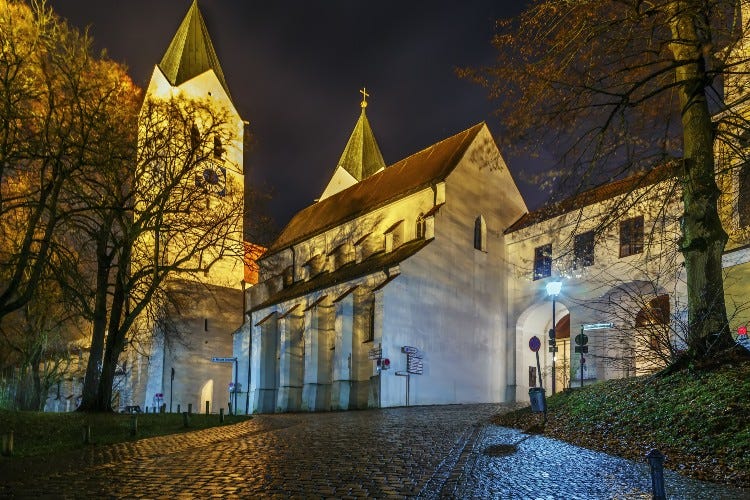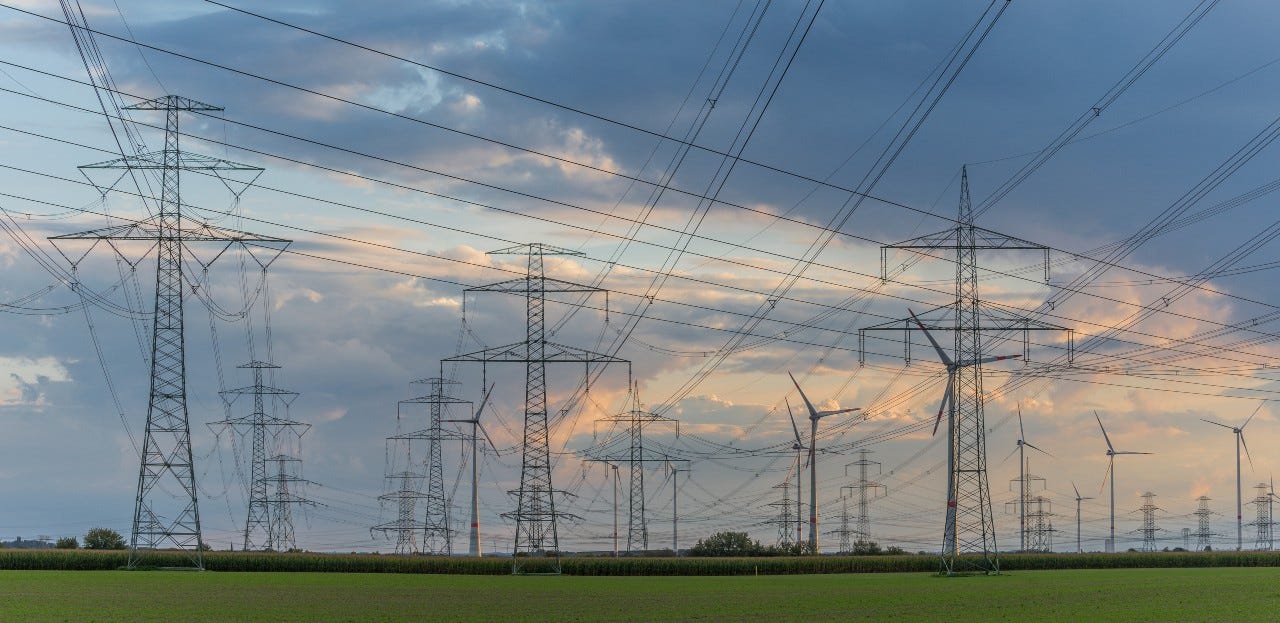Germany's invisible Chancellor
Olaf Scholz arrives in Washington with Germans asking where he's been hiding.
You know that the new government has a serious public image problem if Recep Tayyip Erdogan is getting weak at the knees thinking about Angela Merkel.
During a trip to Kiev this week, the Turkish strong man, who once compared Merkel to the Nazis, reminisced that: “Merkel used to arrive holding the key to the solution. No such leader exists at the moment.”
It’s not just the Turkish president who worries about a lack of smarts in Berlin. Among allies, Germany’s new government is increasingly seen as unreliable due to its refusal to be specific about what sanctions Moscow would face in the event of war.
Domestically, Chancellor Olaf Scholz has been accused of hiding during the crisis - he has barely been seen for weeks. Collapsing polling figures (down 17 percent) suggest he is facing a crisis of authority after less than two months in power.
Scholz’s woes were deepened last week when Haupt-Putinvertseher and former SPD Chancellor Gerhard Schröder was offered a job on the board of Gazprom, probably as reward for accusing Ukraine of “sabre rattling.” Some allies worry that what Schröder says is how Scholz thinks.
Now, the embattled Chancellor has the chance to turn things around.
He touched down in Washington today for his Antrittsbesuch in the American capital. The German press have noted that the visit provides him with a unique opportunity to demonstrate to the democratic world that Berlin can still be trusted.
Just before take off, Scholz gave an interview to public broadcaster ARD at Berlin Airport, in which he reassured the German public that he has things under control.
The idea Germany is seen as unreliable abroad is “a false impression,” he claimed. “We have quite a bit to offer, for example we contribute the most troops to Nato from continental Europe. Our allies knows that and it means a lot.”
The Chancellor is not known as the Scholzomat for nothing, though. In the ARD interview, he stuck to vague, pre-prepared statements, saying Russia would “pay a high price” for invasion while refusing to mention the words Nord Stream (the Baltic Sea gas pipeline).
Later on Monday, he will give a joint press conference with President Joe Biden. Will we witness any dramatic announcement such as an increase in the German defence budget? Unlikely, I’d say.
What are the experts saying?
Thorsten Benner, head of the Global Public Policy Institute, wrote in Der Spiegel that:
“The meeting with President Biden in Washington offers Scholz the stage to correct this impression [of being unreliable]. He should once again emphasise emphatically that all sanctions (including a stop for Nord Stream 2) are on the table. At the same time, he should distance himself in no uncertain terms from Gerhard Schröder, whose lobbying for Russian state-owned enterprises and unconditional defence of the Kremlin's policy is damaging not only the SPD, but also Germany.”
Rieke Havertz, international correspondent for Die Zeit:
“The meeting between the German Chancellor and the US President will not bring an end to the crisis. But parallel to the meeting of French President Emmanuel Macron with Vladimir Putin in Moscow this Monday, a consistent Scholz at Biden's side could send a clear message to Russia: That the common, immovable American and European line has been drawn at all levels.”
Relief for priests?
Two of the most senior members of the Catholic Church in Germany broke a holy taboo last week by calling for an end to mandatory celibacy for priests.
First up, Cardinal Reinhard Marx, archbishop of Munich and Freising, told the Süddeutsche Zeitung that: “For some priests, it would be better if they were married. Not only for sexual reasons, it would be better for their lives and they wouldn’t be lonely.”
A couple of days later, Georg Bätzing, the chairman of the national bishops’ council, confirmed he was also in favour of ending the separation between the priesthood and marriage.
While neither man made a direct link, the proposals come in the immediate aftermath of a damning report into the church’s failure to act against sexual abuse in Marx’s own diocese. A law firm investigated reports of sexual assault by church employees from the end of WWII until 2019 and found hundreds of incidents in which priests faced no punishment despite compelling evidence against them.
Most explosive was the revelation that Pope Benedict XVI, in his role as Archbishop of Munich in the 1980s, ignored four different complaints of sexual assault.
The Catholic Church in Germany is currently experiencing something of a 1968 moment. The Munich scandal follows an attempt to cover up a similar report in Cologne.
Adherents have been leaving the church in their thousands. But at the same time, church members have been outing themselves as queer as part of the #OutInChurch movement. Meanwhile renegade priests have been rebelling against the Vatican by blessing gay couples.
A poll published by Bild am Sonntag at the weekend suggests a large majority of Catholics are in favour of liberalization. Three quarters said they supported an end to mandatory celibacy.
ECB delights the Germans
To the uninitiated, it sounds like an extremely modest change of course. But it has been met with delight by the German financial press, with the Frankfurter Allgemeine Zeitung (FAZ) describing it as “spectacular.”
European Central Bank head Christine Legarde announced after a meeting of Eurozone central bank bosses on Thursday that inflation risks had “titled to the upside” and the bank could thus no longer ruled out a hike in interest rates.
As I wrote last week, Thursday’s meeting had been awaited with great anticipation in Berlin and Frankfurt. With inflation hitting heights not seen since the early 1990s, a growing number of economists and bankers have been urging the ECB to ditch its lax monetary policy.
After Lagarde’s statement, German banks are now predicting an interest rate rise of 0.5% by December and an announcement on ending bond purchases in March.
According to the FAZ, the ECB needed to prepare the markets for a more hawkish future. “The EBC did so on Thursday - and the financial markets got the message,” the newspaper wrote approvingly.
What Members are reading
Two young police officers were brutally murdered on Monday. Thankfully, police were soon able to arrest to suspects. But are there deeper lessons to be learned from the crime? I take a look a the history of officers dying in the line of duty in Germany and ask: is their job becoming more dangerous?
If modern Germany is famous for one thing it is its ambitious attempt to produce most of its electricity by using wind and solar power. This is a complicated project, not least because the wind blows in the north while heavy industry is in the south. I take a detailed look at the attempts to transport wind energy across the length of the country… and why the project has so far been a multi-billion euro failure.
Quote of the week
A year after the German Review first reported on leading virologist Christian Drosten's potential bias in discussing how the pandemic started, and a week after I highlighted previously secret emails that raise more serious questions over his public utterances, some German-language outlets have finally caught up.
Switzerland’s main broadsheet, the Neue Zürcher Zeitung, ran a long interview with the physicist Roland Wiesendanger, who accuses Drosten of “misleading the public” over a lab accident. That was followed shortly after by an article in political magazine Cicero in which Wiesendanger made similar claims.
Drosten responded on Twitter, saying: “Cicero has offered a platform to an extreme character and has provoked personal attacks against me through suggestive questions. The answers don’t go beyond insinuations; robust factual claims are evaded. This is not an interview, but an incident.”
The virologist’s response was high on indignation and low on substance. Let’s see whether that is enough to end the matter.
Reader’s question
On the subject of the SPD still pursuing a Cold War-era Russia policy, one reader asked:
The Greens have certainly moved the next generation into their top leadership positions. Is there pressure within the SPD to do so? Merkel was much younger than Scholz when she took office, and he is her current age. The inner workings of that party are ...opaque to me, and the current Ukraine crisis has only made it cloudier.
My reply:
“The new SPD co-leader Lars Klingbeil is in his early 40s. He is basically what Germans call a Machtpolitiker - as party secretary he was often a bit too transparent in his attempts to blame everything that went wrong in the 'grand coalition' on the CDU. I don't see much changing with him - he's been put in place to keep the party loyal to Scholz.
More interesting is Kevin Kühnert, who took Klingbeil's place as SPD general secretary. He's still only 32 and is a great self-publicist. He's tried to push the party to the left in recent years with provocations on taboo subjects like expropriation. At such a young age he is already the most influential figure on the party left. On Russia he is old school and has recently said the West is ‘talking itself’ into a conflict.”
Video of the week
By popular demand: a new section that highlights a trending meme or video from the past seven days.
This week: The tallest autobahn bridge ever to be demolished. The bridge in Rinsdorf, NRW, was 70-metres tall and half a kilometre long before it came tumbling down on Sunday.
120 kilograms of explosives were packed into its legs, which caved in simultaneously, revealing the new bridge behind it.
Recommended read
For all you foreign policy wonks, here is a piece in English from the DGAP, Berlin’s leading foreign affairs think tank, on how ill-prepared the new government was for an international crisis when it took over.
It’s not all bad news. The article highlights aspects of the coalition agreement, which, if implemented swiftly, can reassure partners of Germany’s commitment to common defence.
Choice quote:
“The ideas and strategies in Germany’s toolbox to achieve its security objectives remain limited and lack coordination. While many allies and competitors no longer define conflict along the dichotomy of war and peace, Germany still does.”
Random find of the week
At long last, I’ve found a namesake more palatable than (now deceased) Austrian far-right leader Jörg Haider.
Der Nackte Jörg was such a legendary figure in 1990s Frankfurt that there was even a section on him in the Lonely Planet guide book.
Jörg would pop up all over town dresed in nothing but some trainers. He was always polite to a fault and, if asked why he walked around naked, replied that he couldn’t stand the feeling of cloth on his skin. Locals remember him turning up at university lectures in nothing or at the dentist.
The Frankfurter Allgemeine tried to find out what happened to him. Apparently he still lives in Sachsenhausen and now refers to himself as “der ehemalige nackte Jörg.”
Anything you want to ask/correct/get off your chest? Reply to this email!








Interesting link to a very level headed DGAP article but it would take a near revolution to convert a majority of Germans to that kind of thinking and understanding of the historic changes in conflict development and (hopefully) resolution.
Not a good start... we will see how this will end up. The US Press seemed more interested in Baerbock's visit than Scholz's, she is not in bed with the Russians. (I am living and writing from the US now).